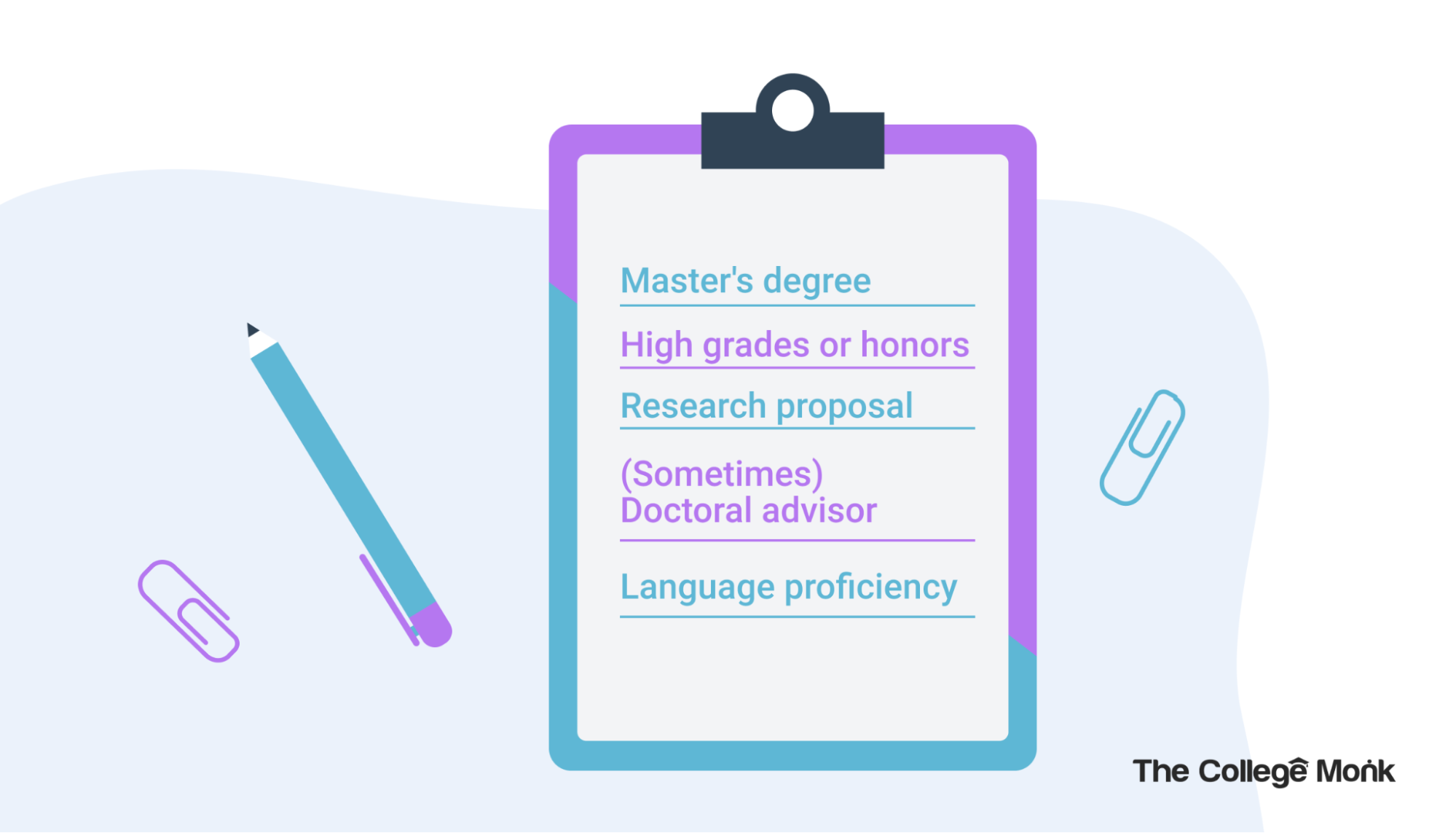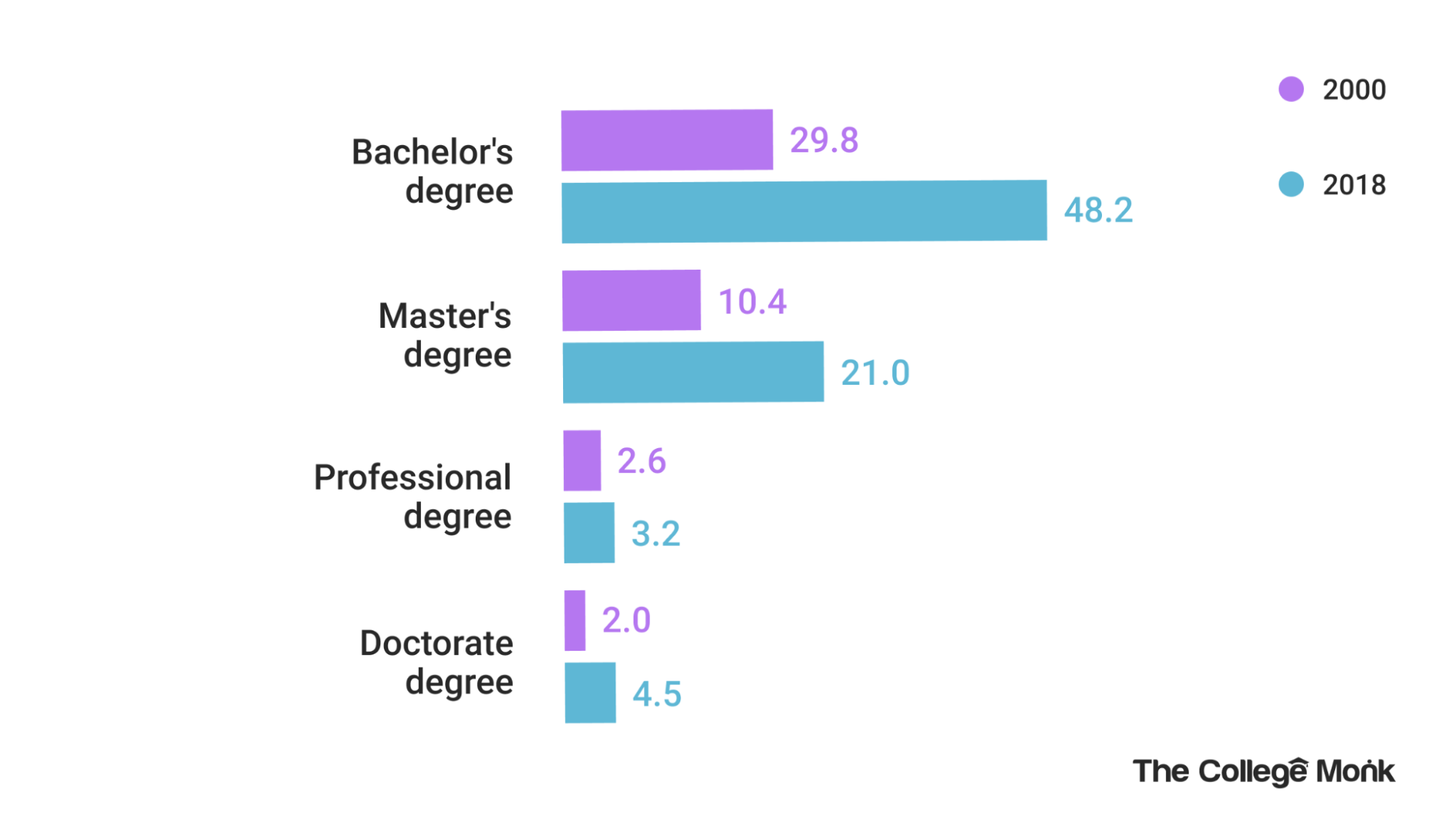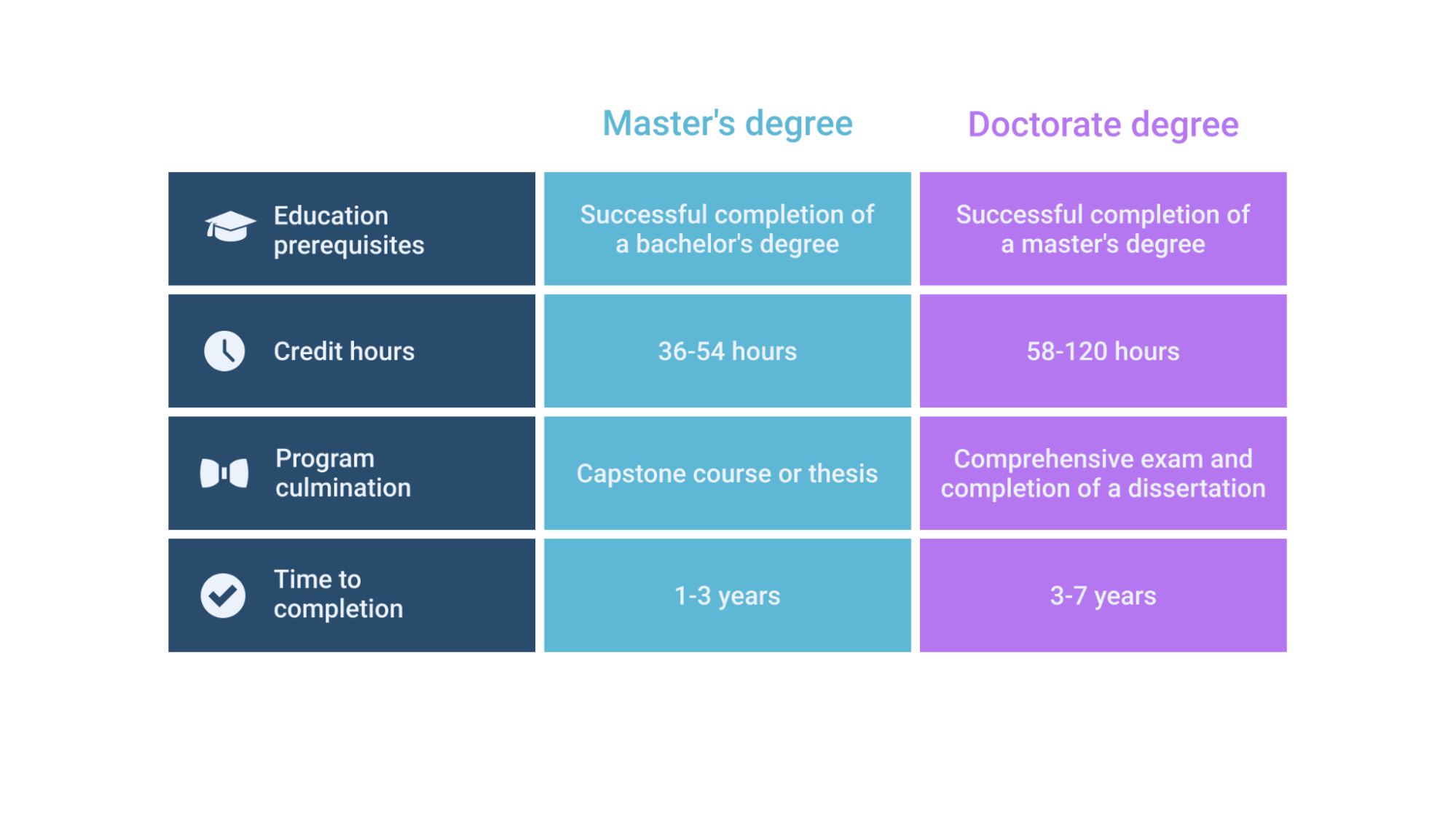What is a Doctorate Degree? Your Guide to Earning a Doctorate in 2022
Are you considering a doctorate degree? Learn about the different types of doctoral degrees, what it takes to complete one, and how to qualify for a program.
What is a doctorate degree?
A doctorate degree is the highest level and most prestigious academic degree you can earn in almost any stream of education. Read on to learn more about what a doctorate degree is and how you can get one.
You want to be the best in your area of study and show employers that you’ve got a comprehensive understanding of your field.
That’s where a doctorate degree can help.
A doctorate degree is an advanced education program. It’s one of the highest levels of education that you can achieve. Doctorate degrees are also globally recognized and respected.
The problem is that getting a doctorate degree can be a long and difficult process. It takes years of study and research, and you also need to complete a thesis before you can graduate.
A doctorate degree is usually preferred in research-heavy academic fields. If you’re looking to become a professor at a prestigious university, a doctorate is also often required.
Before you can enroll in a doctorate program, you’ll typically have to complete a master’s degree program. However, some universities will allow students to pursue their Ph.D. after completing just a bachelor’s degree.
Let’s take a closer look at what a doctorate degree is, what you need to be eligible for one, and how long it takes to earn.

Eligibility to enroll in a PhD or doctoral program
Here's what you'll need to maximize your chances of being accepted into a PhD or doctoral program.
- Completion of a bachelor's or a master's degree
- Minimum grades are often required, and you should have at least a B+ or 3.0 GPA
- Institutions may require students to find a professor to guide and advise them in the program
- Any standardized testing required in your country must be completed
- GRE (graduate record examination) scores are often mandatory
- TOEFL, IELTS exam tests are necessary for non-native English speakers
- A statement of purpose explaining why you want to enroll and how you’ll add value to the program may be required
- A PhD research proposal must be presented
- Letters of Recommendation
- Resume or a CV
- Academic transcripts
There are also PhD and doctoral degree online programs that are available. These can be completed in approximately the same amount of time as an on-campus program.
For online programs, the presentation of your thesis and all learning is done online.
A doctorate degree program generally consists of between 60 and 120 credits.

How long does it take to get a PhD?
The duration of a PhD program is typically between three and five years. But, it could be more if you're pursuing your PhD along with full or part-time work.

What is the difference between a Doctorate vs PhD degree?
The main thing that differentiates a doctorate from a PhD is the amount of research required.
A doctorate graduate demonstrates the ability to evaluate and apply knowledge in their given field.
A PhD does all of this as well. But a PhD graduate also demonstrates an in-depth ability to use research skills. They contribute original research and knowledge to their field before the completion of their program.
Doctorate holders are experts and scholars in their field. Their research is usually related to a particular profession or area of study, although there are some interdisciplinary doctorate programs.
Do you need a master's degree to get a PhD?
No, it's not necessarily mandatory to have a master's degree to pursue a doctoral degree.
However, many courses and institutions do require students to have a master's degree since it provides a better foundation than a bachelor's degree to start research. And having one definitely doesn’t hurt your chances of being accepted into a doctoral program.
Types of doctoral degrees
Some of the common doctoral degrees are:
1. Professional doctoral degrees
These are the degrees that are awarded for a particular field.
A doctoral student earns knowledge and practice in a specific field and subject.
A professional doctorate degree provides application-based practices and includes research work and analysis. You may need some career experience before enrolling in this type of degree program.
Some examples of this degree are:
- Juris Doctor (JD) can be pursued if you're interested in making a career in law or want to attend law school. The program's duration is for three years. It makes one aware of the legal principles and legal institutions, and it’d help you become an expert in the legal field and advise professionals.
- Doctor of Public Health (DrPH) prepares you for leadership positions in the healthcare and public health sector. It provides skills in communication, management, and innovation.
- Doctor of Business Administration (DBA) helps in developing knowledge of management and business. The course provides an interdisciplinary perspective, and it helps in finding practical solutions to the problems of modern-day business.
- Doctor of Nursing Practice (DNP) provides practice and application-based knowledge to students in the nursing profession. It's more practical than other doctorate programs. You’ll be required to provide patient care and team administration in the healthcare and clinical setting.
- Doctor of Public Administration (DPA) aims to develop leadership qualities in an individual and teaches them to make an impact on public and private organizations. It deals with issues such as criminal justice, good governance, public policy, and many others.
- Doctor of Medicine (MD) is a four-year degree that combines the practical, clinical, and medical practices along with the coursework. It enhances the knowledge and helps in developing a career in being a physician. Physicians also have to complete a residency program to gain real-time experience.
- Doctor of Dental Surgery (DDS) is a degree that you can pursue if you want to become a dental surgeon. It is a four-year program and combines theoretical and practical applications. It provides training on dental anatomy and the care of the patients.
- Doctor of Psychology, or PsyD, prepares students to practice psychology in a broad range of clinical settings. They primarily work directly with patients.

2. Research doctoral degrees
As opposed to an applied doctorate, a research degree focuses on traditional subjects and original research in particular fields. It prepares you for a diverse range of careers. But the underlying focus is on the deeper theoretical understanding of the subject.
The research completed for this program must be publishable.
Some examples of research doctoral degrees are:
- Doctor of Arts (DA) provides an interdisciplinary studies degree in various areas. Graduates can help solve different problems and tackle situations. It enhances thinking and writing abilities in various contexts, such as nature, philosophy, religion, and many others.
- Doctor of Science (D.sc/S.cd) is the highest level of degree attained in the field of science. It provides exceptional qualities to excel in research and its methodologies. It's awarded in the field of natural sciences.
- Doctor of Divinity (DDiv) is awarded to the individuals who have dedicated their lives to theological endeavors. It provides expert knowledge of religious study and indulges in research.
- Doctor of Philosophy (DPhil) is a degree that's awarded after a student completes a thesis that is significant for the subject. The general subjects are included in the curriculum, and the course teaches research and innovation.
3. Honorary doctorate
At their discretion, a university can waive their professional doctorate degree requirements. In this case, they may award someone with an honorary doctorate.
This means that a person can obtain a doctoral degree without having to complete a program. There’s no need to attend class, pass exams, write a dissertation, or complete any other work typically associated with a PhD program.
Universities award this professional degree to honor a person’s contributions to society or a specific field of study.
For example, Paul McCartney of The Beatles was awarded an honorary Doctorate of Music from Yale in 2008.
What does it take to complete a doctoral degree?
Here are the typical requirements for a doctoral degree:
- Finishing your thesis
- Passing all required classes and earning all semester credits
- Presenting and defending your thesis
Why choose a doctorate?
Here are some of the reasons to consider earning a doctoral degree:
- You can become an expert in your area of study
- You're someone who would enjoy the academic environment
- You want to develop some important transferable skills
- You can demand a higher salary after graduation
Online doctoral program options
Many doctoral programs are now offered online. Here is a list of common ones:
- Doctor of Education (EDD programs)
- Doctor of Physical Therapy
- Doctor of Audiology
- Doctor of Nursing Practice
- Doctor of Engineering
- Doctor of Social Work
Universities offering doctoral degrees
Here are universities that offer online doctoral programs:
- North Carolina Central University
- Sullivan University
- Indiana Wesleyan University
- Colorado Technical University
- Liberty University
- Capella University
- University of Phoenix
- Walden University
Careers that require a doctoral degree
These are careers that commonly require a doctoral degree:
- Research scientist
- Professor
- Analyst in various sectors
- Patent lawyer
- Scientific advisor
- Government department advisor
- Business developer manager
How to get a doctorate degree?
Here are 10 steps through which you can acquire a doctoral degree:

Step 1. Complete basic education
The first step toward getting a doctoral degree is completing an undergraduate degree.
It typically takes around four years to complete an undergraduate degree.
Choose a subject that interests you since you’ll be devoting a lot of time and effort to the program.
At least a bachelor’s degree is usually required. This provides you with the necessary foundation and relevant skills in the area that you want to study.
For example, if you want to study international relations, you can pursue a degree in political science. It'd provide you with a broad knowledge of the subject since international relations are a part of political science.
Try to maintain a good GPA during your undergraduate degree program. The better your grades are, the higher chance you’ve got of being accepted into a doctorate program.
Talk to faculty members and gain insight into their doctorate program. Guidance is necessary when you're pursuing a doctoral degree, so being in touch with the faculty members is important. Introduce yourself and talk to them about your interests in your particular field.
You can also speak to the current graduate students. They can help you make the correct selections about your coursework.
Complete a master's degree if necessary. This degree would provide you with a specialization in a particular field or subject. It gives a professional approach towards the subject and teaches how to apply the applications of the subjects in real life.
It'll take about two years to complete. To get accepted into a master’s program, you usually need to have minimum GRE or GMAT scores that each school requires.
Note that it’s not mandatory to hold a master's degree to be accepted into all doctorate programs. As an alternative, you may decide to take on an internship that will provide you with research exposure.
You can work in labs or go for fieldwork to enhance your skills and also give a great impression on your resume.
Getting involved with the academic-based departments and societies will also help. It'll get you involved in discussions with people in your program and help you to gain knowledge.
You should start looking for universities offering graduate school programs and their respective deadlines early. Do this well in advance of the next academic year. Research the program you are interested in, including its structure, application fee, job opportunities after completing the degree, and other details.
Step 2. Take the required tests and collect recommendations
Many PhD programs require students to pass the GRE. This test shows their knowledge of various subjects.
You’ll take this test before applying. You can also retake the test, so make sure you do it before the deadline, as the scores will be sent to the university.
You’ll also want to get letters of recommendation from the people who know about you and your work. They can be faculty members or former professors. You should ask for these letters at least three months before the submission of the application. Don't leave it until the last minute.
Step 3. Decide the objective of your research
You’ll need to prepare your statement of purpose.
This highlights why you're applying for the program, what your objectives are, and how you'd carry out your doctorate. You can describe what you wish to do in your research.
It should also highlight why you'd like to work with a particular faculty as your guide and supervisor.
Choose a research topic that hasn't been published before and that no one else has worked on before. It should be unique.
Step 4. Collect the required documents
Check for the necessary documents needed for submission and the deadlines before which you should submit them.
The application form must be completed with the college transcripts of a bachelor's degree and master's degree (if enrolled in any).
In some programs, you'll also need to keep a portfolio of your work. This is particularly important in design-based or artistic degrees. Include any graphic design, examples of writing, or previous research papers that are relevant.
An updated resume or a CV should be presented along with GRE or GMAT scores, letters of recommendation, and a statement of purpose. International applicants will also need to present IELTS or TOEFL exam scores.

Step 5. Apply for the program and check the funding
If possible, apply for the programs where funding for your education is available. Advanced degrees can be expensive, so it's better to go for the programs that are fully funded, which is often the case with doctoral programs.
You can also apply for teaching and research assistantships where you can work and earn money to pay for your program.
Apply for a financial aid program. This will require you to present financial statements, plus your research description and any other requirements. It differs for various institutes and programs.
You can also look into need-based scholarships.
Step 6. Choose a research supervisor and submit the research plan
Choose an advisor who's related to your field of research. They can provide you with the resources and equipment you'd need for your further studies.
Present and submit the blueprint of your plan of study. The plan of study is usually submitted to the school or the department head. They'll evaluate your plan and suggest modifications.
You'll also need to include things such as the names and signatures of the committee members and your student ID.
You should mention your academic objective, and it should highlight your research purpose.
You must list the required courses needed for your research purposes, along with the department name and the guide/instructors. You should break it down and highlight which semester you’ll want to study each course.
Step 7. Start your independent research
At this point, you’ve completed the required tasks above. You’re enrolled and can start doing independent research, plus completing the required credits for your course.
You'll be required to complete both mandatory coursework plus any electives.
Each course will require you to pass an examination. This is usually a written test where you prove your knowledge on a given subject.
After successful completion of all required exams, the dissertation process starts.
Step 8. Read and collect data
At this stage, you can begin with research and start collecting relevant data. You start by stating a hypothesis.
Once you have your hypothesis, here are steps you can take to collect research:
- Read literature related to your topic and research accordingly
- Conduct the experiment, surveys, or whatever else is necessary
- Prepare your thesis and devote your time to reading and researching
- Update your faculty guide on your work and take guidance
Step 9. Prepare for viva-voce and faculty interaction
As a doctoral candidate, you’ll need to prepare for a viva-voce (thesis defense). This is where you present your dissertation before a committee.
In the session, you'll have to present your progress on the topic and defend your research with relevant arguments. You'll be asked questions related to your research.
Step 10. Apply for grants and be responsible
You should apply for the grants offered by the department as they can help you fund your education and provide you with a basic stipend.
You can also apply for research grants, which you may get from private or public sources.
Balance both the coursework and responsibilities. Go step-by-step, as it'll take a lot of hard work and patience to complete your doctorate degree.
Many difficulties may arise, such as funding problems, lab problems, and other things. Make sure not to lose your patience, and try to create opportunities for yourself. Stay organized throughout your work.
A doctoral degree can open doors
A doctoral degree is the highest degree level available at college or university.
Having this higher education will help advance your career. It provides you with advanced knowledge since research is a major aspect of it.
Students who complete a doctorate can achieve top positions in various organizations, whether in the corporate or academic world.
It makes you one of the most valuable people in your field and opens up lots of opportunities.
Doctorate graduates can also go on to do further research.
This degree provides you with abilities that act as a huge differentiator between you and any other job applicant.
To learn more about earning a doctorate degree online and the different types of doctorate degrees, check out The College Monk.
Frequently Asked Questions
1. Can I pursue a doctorate degree online?
Yes. Many schools offer doctorate degrees online, and discussions and classes are held on an online platform.
2. Is submitting a dissertation necessary for a doctorate degree program?
In most cases, yes. However, in some more applied courses, it isn't required — for example, Doctor of Physical Therapy.
3. Is it possible to fund my doctoral program?
Yes. Doctoral degrees can be funded. Many universities provide a basic stipend for pursuing PhD. You can apply for grants if you need funding for your course.
4. What are the requirements for pursuing a doctoral degree?
You should have a bachelor's degree or a master's degree. Minimum GRE or GMAT scores are necessary. Minimum grades are required. Letters of recommendation and a statement of purpose will also need to be provided.
5. What is the duration of completing a doctoral degree?
The duration can range from three to five years, depending on the type of course. Many doctorate students also take additional years to complete their thesis.
Frequently Asked Questions
1.Can I pursue a Doctorate Degree online?
Yes. Many schools offer doctorate degrees online and discussions and classes are held on an online platform.
2.Is submitting a dissertation necessary for a Doctorate Degree Program?
In most cases, yes. However, in some courses, it is not required, for example, Doctor of Physical Therapy.
3.Is it possible to fund my Doctoral Program?
Yes. Doctoral Degrees can be funded. Many universities provide a basic stipend for pursuing Ph.D. You can apply for grants if you need funding for your course.
4.What are the requirements for pursuing a Doctoral Degree?
You should have a Bachelor's Degree or a Master's Degree. Minimum GRE or GMAT scores are necessary. Minimum grades are required. Letters of recommendation Statement of Purpose.
5.What is the duration for completing a Doctoral Degree?
The duration can range from 3 to 5 years, depending on the type of course.